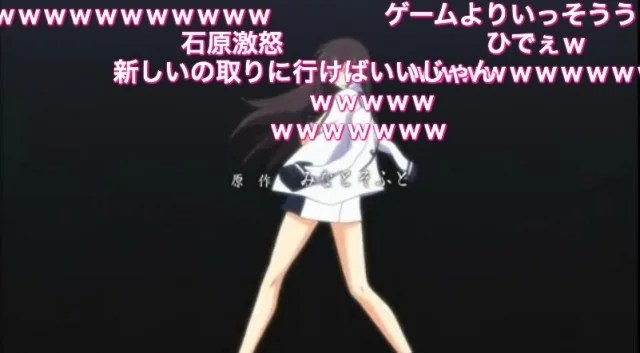O-inari-san! Yes, inari-zushi is a sushi wrapped in fried tofu. Because fried tofu is a favorite food of fox. And Inari is the grain goddess, whose familiar is fox. So, that’s why fried tofu is called “inari.” And Inari’s Buddhist counterpart is Dakini, which Asahara Shoko referred to his mistresses.
Yamato impersonates o-inari-san with his naked body to Chris since her favorite food is o-inari-san.

Majikoi simply ran out of plot after the first episode, so it’s been resorting to erotic gags, which are escalating, especially episode 4! Now the intro of each episode is done by Miyako. Her perverted jokes are getting out of control. She’s giving Yamato a hard time, wearing his underwear. Miyako is super awesome!
I can’t believe their interaction. I never heard that kind of abnormal conversation in my life. “Ore-no-Pantsu, kaese! (Hey, give me back my underwear!)” A mere sound of wording makes me laugh. Man, I haven’t laughed this hard for a long time. Oh, yeah, since Manyuu Hikenchou.
2-D is divine! How much I want to share erotic conversations with girls… Why aren’t there any girls as erotic as Miyako?
石原激怒!Ishihara gekido!
“Gov. Ishihara must be furious!” That’s the comment I saw when I was watching Majikoi. Otaku are aware that Ishihara has been trying to regulate anime/manga’s “obscenity.” So, whenever erotic depiction shows up in anime, they sarcastically comment, “Ishihara gekido!”
Ironically Ishihara himself is an obscene writer. His novels are all about rape and murder. His first bestseller novel was about a high school kid penetrating shoji with his phallus. And these shoji breakers were called “Taiyo-zoku (sun tribe).” Very different from Figure-Moe-zoku.
Shoji played a very important role to set up personal space in such a densely populated society like Japan. Yes, Japan didn’t have a door to protect privacy. Even for the sacred and inviolable Emperors, no door, just a curtain. So, breaking shoji is violence, i.e., rape. Invasion is violation of the boundary, personal space/privacy. Trespass. That’s why “to rape” is “violar” in Spanish. Violador (rapist). In fact, both “violate” and “violence” came from a Latin word “violare.”
Rape victim can be symbolized as broken window, broken door, but in Japan, broken shoji. There’s a saying in Japanese, “Shoji have eyes,” meaning your secret is not safe. In other words, shoji have the eyes of Big Brother. Whether government intrusion (socialism) or corporate intrusion (capitalism), violadores are everywhere. In Korea, there’s sinbang-yeotbogi, family intrusion. Don’t we all have right to personal space, right to one bedroom apt for each individual?
So, breaking the door with guns = breaking shoji with phallus is eminent domain (Supreme Lordship). The First Man. Nikushokukei. Conquistador. Violador. But the Last Man, Soshokukei, NEET are withdrawn behind shoji. Hikikomori is a feminized man. Men went outside to hunt and women stayed inside to cook. But now, men stay at home too. Look how men have evolved! We’ve come a long way!

And in Majikoi, inviolable phallus is getting violated.

In Ishihara’s novel, phallus is the violator. But now, yoni is nikushokukei, breaking men’s shoji, breaking into men’s locker room, doing kunka kunka (smelling)!
Thus, Ishihara’s phallic myth is crumbling, especially in anime/manga field. That’s why Ishihara is upset, taking a cheap shot at anime as his last moment. Simply his time is over. Yet, he’d rather die than admitting his defeat, like his hero Mishima.







I love inari-zushi as well. Not sure about the anime, but I have just finished reading 2 volumes of the Blue Exorcists, so there’s Inari mentioned in it as well. ^_^
@animemiz
Cool! Well, it’s a common food in Japan. I’ve no idea if Blue Exorcists’s inari was also an “obscene” joke. Inari was part of Majikoi gags, somehow Gintamaesque. But I thought Majikoi gags were erotically hilarious that Tokyo Gov. Ishihara would target this “obscene” anime, despite his novels are “obscene.” See what happens if his novels are animated or made into manga (e.g., the image I put in the middle of my article). Which would be more unhealthy to youth, Majikoi or his novels? That is the whole point of my article.